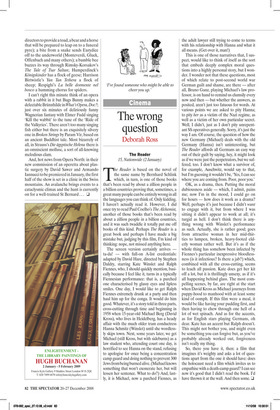The wrong question
Deborah Ross
The Reader
15, Nationwide (2 January) The Reader is based on the novel of the same name by Bernhard Schlink which, in turn, is one of those books that’s been read by about a zillion people in a billion countries proving that, sometimes, a great many people can be entirely wrong in all the languages you can think of. Only kidding. I haven’t actually read it. However, I did once try to read Paul Coelho’s The Alchemist, another of those books that’s been read by about a zillion people in a billion countries, and it was such twaddle it totally put me off books of this kind. Perhaps The Reader is a great book and perhaps I have made a big mistake but, judging by this film, I’m kind of thinking: nope, not missed anything here.
The screen version certainly arrives — ta-da! — with full-on A-list credentials: adapted by David Hare, directed by Stephen Daldry, starring Kate Winslet and Ralph Fiennes, who, I should quickly mention, basically because I feel like it, turns in a typically Fiennesian performance: that is, a parched one characterised by glassy eyes and lipless smiles. One day, I would like to get Ralph Fiennes extremely drunk at a party and then haul him up for the conga. It would do him good. Whatever, it’s a story told in three parts, cross-cutting through time and beginning in 1958 when 15-year-old Michael Berg (David Kross), who lives in Heidelberg, has a heady affair with the much older tram conductress Hanna Schmitz (Winslet) until she wordlessly skips town. Next, some years later, we get Michael (still Kross, but with sideburns) as a law student who, attending court one day, is horrified to see Hanna on the stand, refusing to apologise for once being a concentration camp guard and doing nothing to prevent 300 Jews from being burned alive. (Michael knows something that won’t exonerate her, but will lessen her sentence. What to do?) And, lastly, it is Michael, now a parched Fiennes, as the adult lawyer still trying to come to terms with his relationship with Hanna and what it all means. (Get over it, man!) This is one of those narratives that, I suspect, would like to think of itself as the sort that embeds deeply complex moral questions into a highly personal story, but I wonder. I wonder not that these questions, most of which relate to post-second world war German guilt and shame, are there — after all, Bruno Ganz, playing Michael’s law professor, is on hand to remind us clumsily every now and then — but whether the answers, as posited, aren’t just too fatuous for words. At various points we are asked to pity Hanna; to pity her as a victim of the Nazi regime, as well as a victim of her own particular secret. Well, I didn’t, just as I don’t pity unrepentant SS operatives generally. Sorry, it’s just the way I am. Of course, the question of how the new Germany (Michael) deals with the old Germany (Hanna) isn’t uninteresting, but The Reader affords all Germans an easy way out of their guilt by saying, hey, it might look as if we were just the perpetrators, but we suffered, too. I don’t know what a survivor of, for example, Auschwitz, would say to that, but I’m guessing it wouldn’t be, ‘Yes, I can see where you are coming from. Poor, poor you.’ OK, as a drama, then. Putting the moral dubiousness aside — which, I admit, pains me; now I’m in the mood, I could go on for hours — how does it work as a drama? Well, perhaps it’s just because I didn’t want to engage with it, but from where I was sitting it didn’t appear to work at all; it’s turgid as hell. I don’t think there is anything wrong with Winslet’s performance as such. Actually, she is rather good; goes from attractive woman in her mid-thirties to lumpen, broken, heavy-footed elderly woman rather well. But it’s as if the whole thing has somehow been infected by Fiennes’s particular inexpressive bloodlessness (is it infectious? Is there a jab?) which, combined with all the cross-cutting, seems to leach all passion. Kate does get her kit off a lot, but it is thrillingly unsexy, as if it’s all happening behind glass. The most compelling scenes, by far, are right at the start when David Kross as Michael journeys from puppy-hood to manhood with at least some kind of oomph. If this film were a meal, it would be like having your pudding first, and then having to chew through one hell of a lot of wet spinach. And as for the accents, as for English stars playing Germans, oh dear. Kate has an accent but Ralph doesn’t. This might not bother you, and might even be something you can forgive but, as you’ve probably already worked out, forgiveness isn’t really my thing.
So, there you have it, then: a film that imagines it’s weighty and asks a lot of questions apart from the one it should have: does the holocaust need a film which invites us to empathise with a death-camp guard? I can see now it’s good that I didn’t read the book. I’d have thrown it at the wall. And then some. ❑






















































































































 Previous page
Previous page